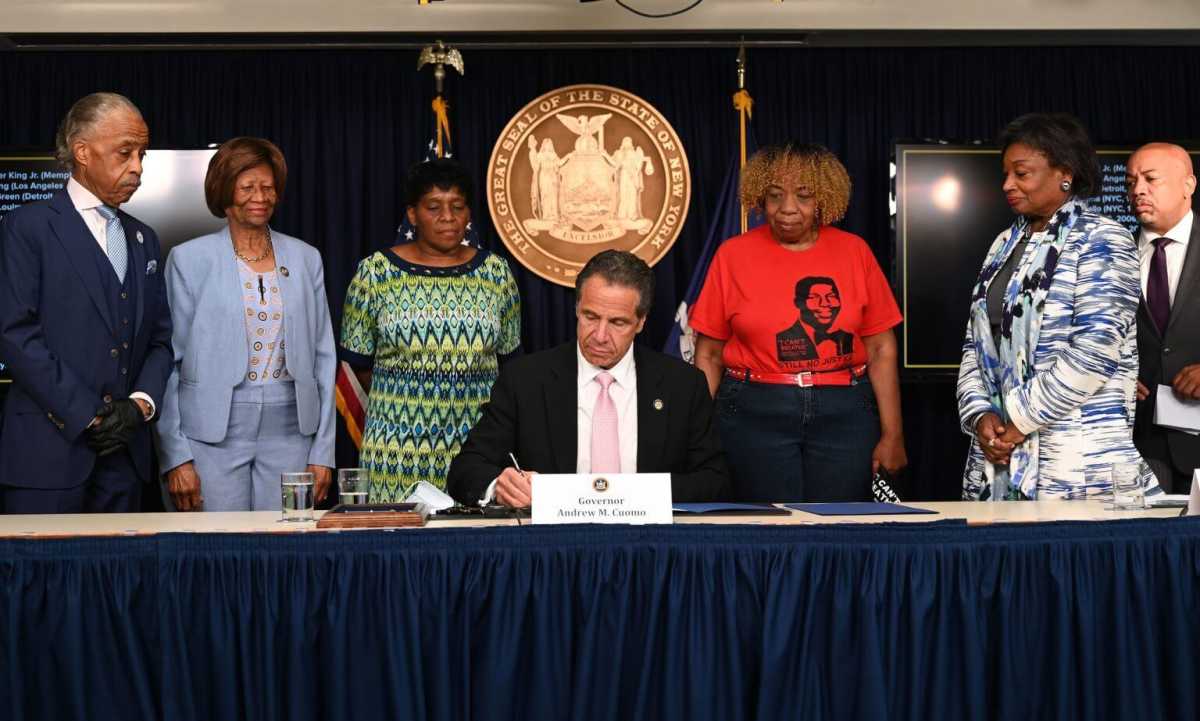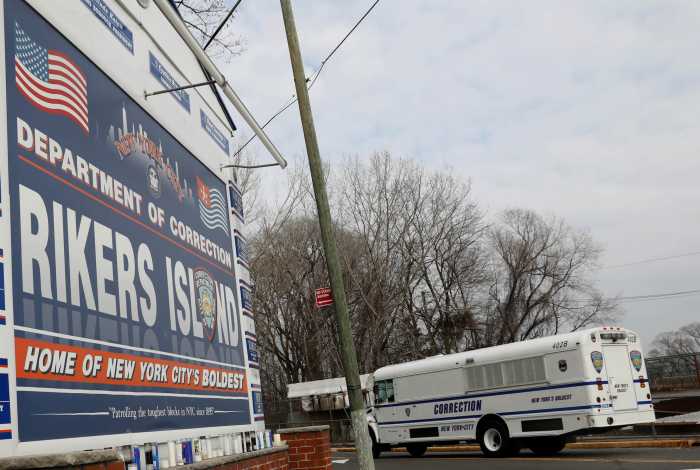During his daily briefing on Friday, Governor Andrew Cuomo signed new reforms into law that are meant to start to reshape the justice system in New York State.
Known as the “Say Their Name Agenda,” the reforms include repealing 50-A, making the disciplinary records of police officers more transparent and available should that officer be accused of misconduct. The reforms also include banning chokeholds, making false race-related 911 calls a hate crime, and assigning the attorney general to serve as the special prosecutor in these cases.
But the governor went a step further Friday by also signing an executive order requiring police departments across New York to work with their communities to devise a plan to modernize and reform their policing strategies — or risk losing state funding next year.
Cuomo was joined by Senate Majority Leader Andrea Stewart-Cousins, Assembly Speaker Carl Heastie and the Reverend Al Sharpton for the signing of these bills, as well as Gwen Carr, the mother of Eric Garner, who died after a police chokehold on Staten Island in 2014, Valerie Bell, mother of Sean Bell, who was killed in a hail of police bullets following his bachelor’s party in 2006, and Hazel Dukes, president of the NAACP New York State Conference.
“New York State is the progressive capital, we never sit back and say just what the nation should do,” said Cuomo. “We show the nation what it should do.”
Cuomo acknowledged that this is only the beginning and that for more change to come the federal government needs to step up and reform the education system, step up its efforts to combat child poverty, create affordable housing, and reshape the nation’s criminal justice reform.
“Why does a child who happens to be born to a poor family have a second-rate education to those who are born in wealthier communities? Why do we still have child poverty in this nation? How do you justify that?” said Cuomo. “Affordable housing is needed across the country because the federal government went out of the affordable housing business. It was the one responsibility that the federal government used to undertake.”
Under the executive order Cuomo signed, called the New York State Police Reform & Reinvention Collaborative, Cuomo is requiring local governments and police agencies to devise a plan that reinvents and modernizes police strategies and programming in their communities. The plans must include ways to address use of force by officers, crowd controlling tactics, implicit bias awareness, community management, de-escalating training and practices, restorative justice practices, community-based outreach, and a transparent citizen complaint disposition procedure.
Each police department’s community must be involved in the planning process. New plans must be enacted by April 1, 2021 — those who do not pass new reforms by then will not be eligible for state funding, the governor said.
“We’re going to say to every police department, sit down at the table with the local community, address the issues, get to the root, get a plan, pass through local government — and if you don’t you’re not going to get any additional state funds,” said Cuomo. “We’re not going to, as a state government, subsidize improper police tactics.”
“We are at a moment of reckoning, there is no question about it,” said Stewart-Cousins. “We know this isn’t a cure. We know this is the beginning of a movement to bring justice to a system that has long been unjust.”
“I was recently asked in an interview, ‘Why now, why did it happen now?’ with George Floyd,” said Heastie. “When it happened with Amadou Diallo, we thought it was time. When it happened with Anthony Baez, we thought it was time. When it happened with Eric Garner, we thought it was time. When it happened with Sean Bell, we thought it was time. When it happened with Ramarley Graham, we thought it was time. But for some reason, I think what people viewed touched a nerve — watching a man being suffocated by strangulation, crying for his deceased mother, I think struck a nerve.”
“I joined the Civil Rights Movement as a teenager, when I was 13 I became part of Dr. King’s branch here. We were told you start with demonstration to lead to legislation, then reconciliation,” said Sharpton. “Without the legislation, the demonstration is just an exercise. This is not an exercise, this is to change things. By signing these bills is bringing the change. What the governor is doing today, and this Assembly speaker and this majority leader of the Senate is doing, is legislating what we demonstrated about.”
Tina Luongo, the out queer attorney-in-charge of the Criminal Defense Practice at the Legal Aid Society, said, “Finally, after years of advocacy, New York has struck down one of the nation’s most secretive laws, a law that shielded police misconduct from public scrutiny. Sadly, we will never know the full breadth and depth of the injustices created under the previous system that deprived New Yorkers access to this fundamental information. But our clients — the majority from communities of color — should know that the Legal Aid Society will leverage this rightful change in statue to wage an unrelenting campaign for police accountability in a way that the New York City Police Department has never seen before. We will ensure that our city knows the names of officers who brutalize New Yorkers and commit other serious acts of misconduct. This is simply the obligation we have to our clients as public defenders: to right the wrongs of decades when the NYPD was permitted to operate with virtual impunity, accountable to no one.”
This article was published first on amny.com. To sign up for the Gay City News email newsletter, visit gaycitynews.com/newsletter.



































